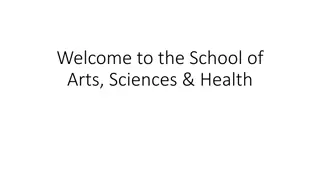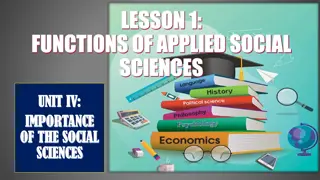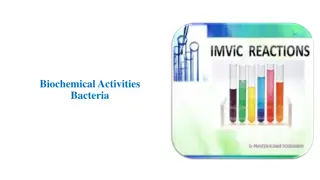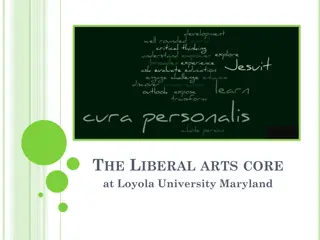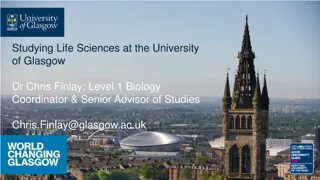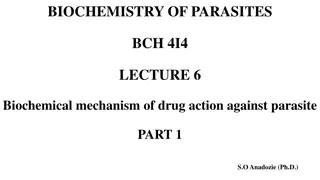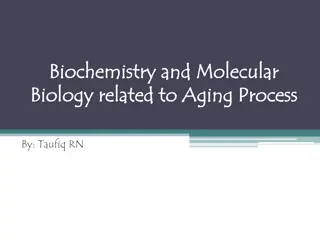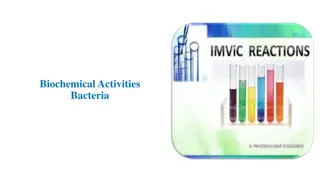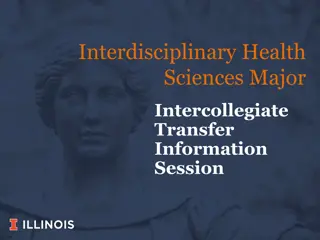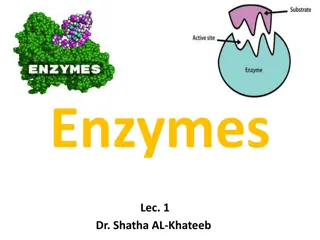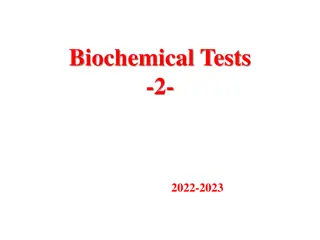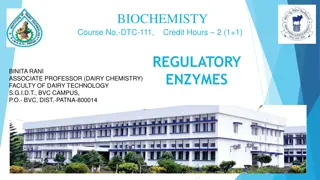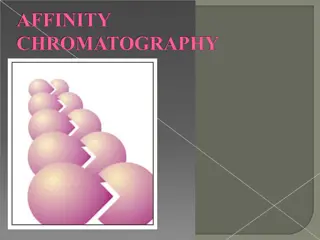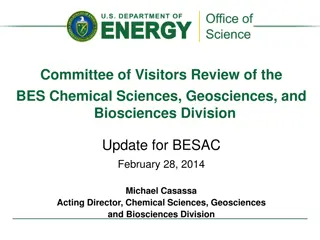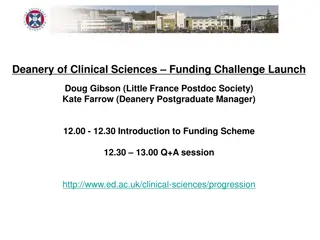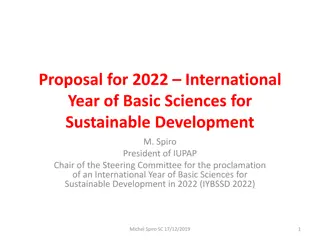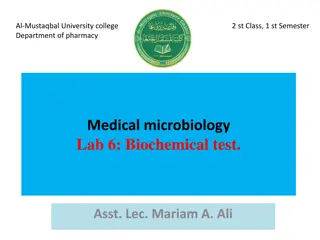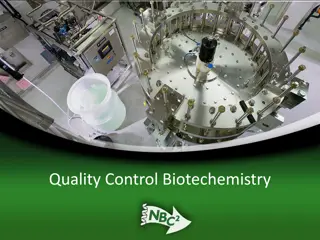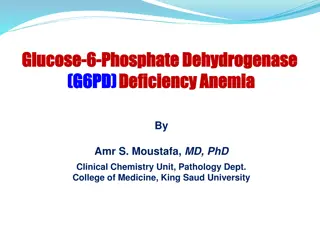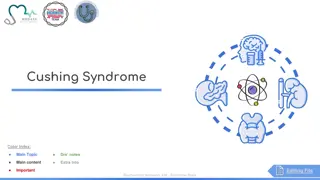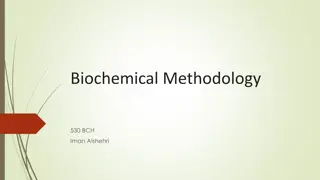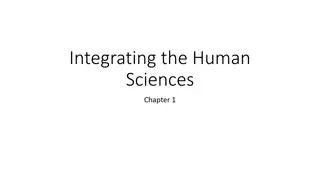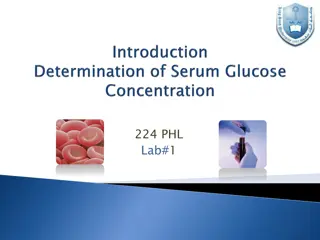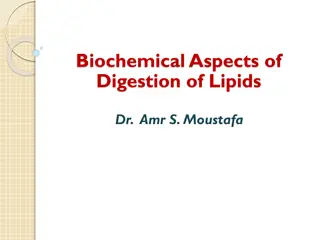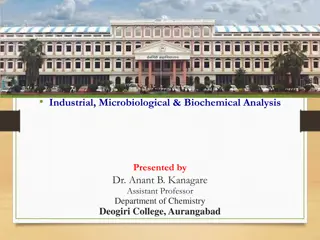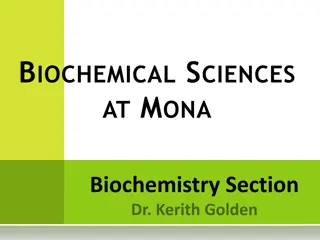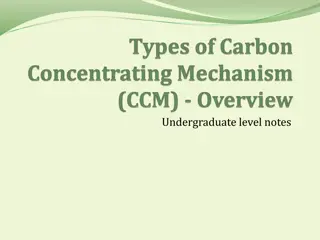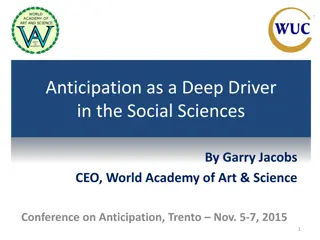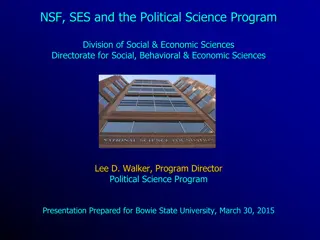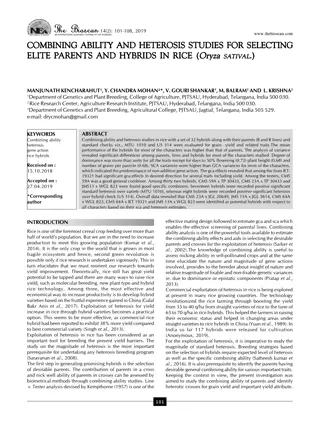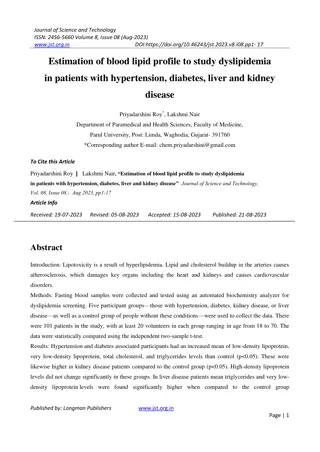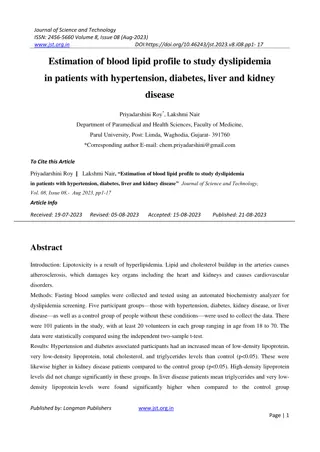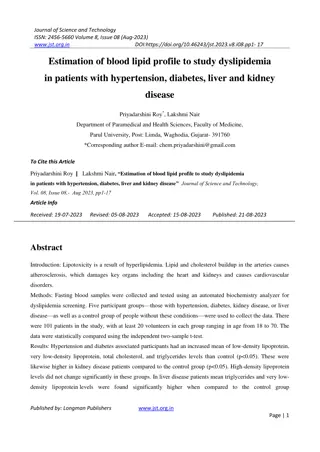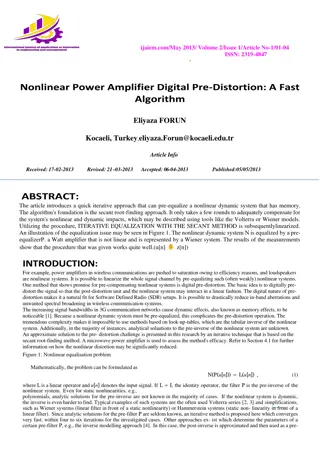Orientation Bachelor of Early Childhood Education – Part-Time (ECE-MAJ)
Singapore University of Social Sciences (SUSS) is Singapore's newest autonomous university, offering a range of undergraduate and postgraduate programs focused on social sciences, business, arts, behavioral sciences, science, technology, law, and lifelong learning. With a student population of over
1 views • 47 slides
Updating ERC Panel Structure for 2024 Calls: Rationale and Main Changes
The European Research Council will revise its panel structure for the 2024 calls to enhance coherence, focus on frontier research, and appreciate interdisciplinarity. The main principles reflect the overarching evaluation policy of the ERC, ensuring a forward-looking approach that evolves with the c
3 views • 12 slides
Explore Programs at the School of Arts, Sciences & Health
The School of Arts, Sciences & Health at OSUIT offers diverse programs in Culinary Arts, Nursing, Allied Health Sciences, Pre-Professional Studies, Pre-Education, Business, and Applied Technical Leadership. From hands-on training in culinary labs to advanced nursing simulations, students receive top
0 views • 9 slides
Importance of Social Sciences in Modern Society
Social sciences play a crucial role in addressing societal issues and understanding human behavior within different contexts. Despite the focus on STEM fields, social sciences are essential in areas like social work, justice systems, and business. This educational content highlights the functions an
8 views • 17 slides
Bacterial Biochemical Identification Tests in Microbiology
Understand the significance of biochemical tests like the Triple Sugar Iron Agar Test (TSI) and the IMViC Test for identifying enteric bacteria. Learn about indole production, methyl red test, and other methods used in bacteriology.
5 views • 17 slides
Loyola University Maryland Liberal Arts Core Overview
The Liberal Arts Core at Loyola University Maryland emphasizes a well-rounded education through courses in Humanities, Social Sciences, Mathematical Sciences, and Natural Sciences. Students take 15 core courses in liberal arts, including writing, history, literature, language, philosophy, theology,
2 views • 19 slides
Life Sciences Degree Options and Curriculum at University of Glasgow
Explore the diverse range of Life Sciences degree choices available at the University of Glasgow, including Animal Biology, Biomolecular Sciences, Human Life Sciences, and Infection & Immunology. Learn about the flexible curriculum structure, career prospects, and research-based work placements offe
2 views • 20 slides
Understanding Biochemical Mechanisms of Drug Action Against Parasites
Parasitic protozoa cause devastating diseases in humans and animals, and chemotherapy is the primary defense. Drug resistance is a challenge, and prevention is crucial. Modern tools aid in studying genetic and biochemical aspects, targeting the parasite selectively. Drugs act by interfering with spe
1 views • 15 slides
Understanding Aging Process from a Biochemical Perspective
Biochemistry and Molecular Biology play crucial roles in understanding the aging process, focusing on the biochemical basis of life, the basis of health, major causes of diseases, and theories of aging. Aging is described as the accumulation of damage due to reactive oxygen species, with theories en
2 views • 11 slides
Understanding Biochemical Tests for Bacterial Identification
Explore the importance of biochemical tests like Triple Sugar Iron Agar and IMViC in identifying enteric bacteria. Learn about indole production and the Methyl Red test, essential in distinguishing bacterial species based on their metabolic activities. Discover how these tests aid in diagnosing food
2 views • 17 slides
Exploring Interdisciplinary Health Sciences Major at AHS
Interdisciplinary Health Sciences (I-Health), offered by the College of Applied Health Sciences (AHS), prepares students for impactful health-related careers. The program provides a holistic view of health, customized for individual goals, and offers applied experiences, research opportunities, and
1 views • 11 slides
Understanding Enzymes: The Key Catalysts in Biochemical Reactions
Enzymes are biological catalysts that play a crucial role in various life processes by speeding up chemical reactions. They are specific, protein-based molecules that lower the activation energy required for reactions, ensuring proper metabolism and efficiency in living organisms. Factors like pH, t
1 views • 46 slides
Understanding the Triple Sugar Iron Test in Biochemical Analysis
The Triple Sugar Iron Test (TSI) is a crucial biochemical test used to differentiate gram-negative enteric bacilli based on their carbohydrate fermentation and hydrogen sulfide production. By examining color changes, gas production, and precipitate formation, microbiologists can interpret TSI result
2 views • 31 slides
Understanding Regulatory Enzymes in Biochemical Pathways
Regulatory enzymes play a crucial role in controlling the activity of biochemical pathways by responding to the presence of specific molecules. They regulate the pathway's activity, ensuring that products are produced in the required amounts at different times. This article delves into the significa
5 views • 22 slides
Pennsylvania State University - Information Sciences and Technology Department Overview
Pennsylvania State University, commonly known as Penn State, is a major institution in Pennsylvania with a significant economic impact. The university offers diverse academic programs through its College of Information Sciences and Technology, focusing on areas such as ICT, engineering, business, la
3 views • 21 slides
Affinity Chromatography: A Breakthrough in Biochemical Research
Affinity chromatography, developed in the 1930s by A. Wilhelm Tiselius, is a vital technique for studying enzymes and proteins. It relies on the specific affinity between biochemical compounds and utilizes matrices like agarose for binding sites. Ligands such as amino and hydroxyl groups play crucia
1 views • 27 slides
Review of BES Chemical Sciences Division Update
The Committee of Visitors (COV) reviewed the Chemical Sciences, Geosciences, and Biosciences Division, emphasizing the importance of COVs in the BES practice. The COV's standard charge involves assessing proposal processes, project monitoring, and evaluating the impact of awards on portfolio breadth
0 views • 16 slides
Deanery of Clinical Sciences Funding Challenge 2018 Launch Event
The Deanery of Clinical Sciences is offering a small grant opportunity for early career researchers within the clinical sciences field. The fund aims to support researchers' current studies and research projects with a maximum grant of £2,500. Applications are open to postgraduates and postdocs, an
3 views • 7 slides
Celebrating Basic Sciences in 2022 for Sustainable Development
The proposal suggests declaring 2022 as the International Year of Basic Sciences for Sustainable Development, aiming to highlight the crucial role of curiosity-driven basic sciences in societal, environmental, and economic progress. Recognizing the significant contributions of basic sciences to vari
5 views • 13 slides
Understanding the ACT Reading Test Content
The ACT Reading Test comprises 40 questions to be answered in 35 minutes, covering four categories: Prose Fiction, Humanities, Social Sciences, and Natural Sciences. Each category has a specific percentage of questions. The test evaluates your ability to comprehend various passages, including prose
1 views • 24 slides
Explore Membership Benefits with the Biochemical Society
Elevate your career with the Biochemical Society membership offering various benefits like grants, recognition awards, and cost-saving opportunities for attending events and conferences. Members enjoy access to prestigious journals and free secretariat services for hosting successful conferences. Jo
0 views • 11 slides
Microbiology Biochemical Tests for Bacterial Identification
Learn about important biochemical tests used in medical microbiology, including the Coagulase test for Staphylococcus aureus, the Catalase test for enzyme detection, and the Oxidase test for electron transport chain identification. Detailed methods and result interpretations are provided for each te
0 views • 17 slides
Biochemical Quality Control Processes in Biotechnology
Quality control in biotechnology involves monitoring and regulating the levels of various components and impurities throughout the production process. Common methods of removal or purification include chromatography, filtration, and extraction. Scale-up considerations include changes in utility requ
0 views • 31 slides
Understanding G6PD Deficiency Hemolytic Anemia: Biochemical Basis and Implications
G6PD deficiency hemolytic anemia is an inherited condition characterized by reduced levels of glucose-6-phosphate dehydrogenase (G6PD), leading to impaired production of NADPH. This deficiency affects the Pentose Phosphate Pathway (PPP) and can result in oxidative stress, causing damage to DNA, prot
0 views • 18 slides
Understanding Cortisol and Cushing's Syndrome: Biochemical Insights
This content delves into the physiological and biochemical aspects of cortisol, diagnostic algorithms for Cushing's syndrome, and the interpretation of laboratory and radiological investigations for diagnosis. Explore the adrenal gland's anatomical features, the HPA axis, and glucocorticoid function
0 views • 16 slides
Biochemical Methodology 530 - Lactate Dehydrogenase Extraction and Purification Experiment
This course focuses on the extraction and purification of lactate dehydrogenase (LDH) using a series of procedures involving tissue preparation, centrifugation, and ammonium sulfate precipitation. The methodology includes detailed steps from preparing the extraction buffer to isolating LDH in differ
0 views • 10 slides
Understanding Human Sciences: Integrating Disciplines for Coherent Insight
This book explores the integration of human sciences, aiming to create a coherent understanding of the key phenomena studied across humanities and social sciences. It advocates for a unified approach that embraces the complexity of relationships and causal links within this system, offering construc
0 views • 6 slides
Understanding Biochemical Experiments and Blood Components
This content delves into various aspects of biochemical experiments, including qualitative and quantitative methods for substance identification and concentration measurement. It also covers the use of a spectrophotometer and different bodily fluids for analysis. Additionally, it explores the compon
0 views • 20 slides
Biochemical Aspects of Lipid Digestion by Dr. Amr S. Moustafa
This lecture by Dr. Amr S. Moustafa covers the biochemical aspects of lipid digestion, including the process, organs involved, enzymes required, and end products. It discusses the assembly, metabolism, and fate of chylomicrons, as well as the clinical manifestations of diseases related to defective
0 views • 31 slides
Industrial, Microbiological & Biochemical Analysis - Course Overview by Dr. Anant B. Kanagare
Dr. Anant B. Kanagare, an Assistant Professor at Deogiri College, Aurangabad, presents a comprehensive course on Industrial, Microbiological, and Biochemical Analysis (Course Code ACH502). The course covers topics such as Industrial Analysis, Microbiological Analysis, and Biochemical Analysis. Dr. K
0 views • 16 slides
Chemistry 1151K Course Overview and Chapters Summary
Upon completion of the CHEM 1151K course, students will apply the scientific method to investigate chemical questions in allied health, utilize dimensional analysis to solve quantitative problems, communicate effectively using chemical terminology and symbols, describe the behavior of biochemical so
0 views • 44 slides
Department of Biochemical Sciences at MONA: Biochemistry Section, Academic Staff, Research Highlights, and Courses Offered
Explore the prestigious Department of Biochemical Sciences at MONA, specializing in Biochemistry, Anatomy, Physiology, Pharmacology, Physical Therapy, and Dentistry. Learn about the dedicated academic staff, research highlights in medical and plant biochemistry, and offered degrees. Discover the com
0 views • 11 slides
Mechanisms of Carbon Concentration in Plants: Biochemical and Biophysical Variants
Biochemical and biophysical mechanisms of carbon concentration in plants involve variations such as C4 and CAM pathways in higher plants, as well as specific adaptations in algae and cyanobacteria. These mechanisms play a crucial role in efficiently managing carbon fixation processes in different ty
0 views • 6 slides
Exploring The Relationship Between Natural and Social Sciences Through Anticipation
Explore the distinct characteristics that define the natural and social sciences, delving into how anticipation serves as a deep driver in the social sciences. Uncover the fundamental principles of human behavior, the role of consciousness and subjective reality in social science, and the influence
0 views • 11 slides
Understanding the National Science Foundation's Social and Economic Sciences Programs
The National Science Foundation (NSF) supports basic research through its discipline-based structure, incorporating mechanisms like Research Experiences for Undergraduates and Minority Postdoctoral Research Fellowships. The Directorate for Social, Behavioral, and Economic Sciences houses programs su
0 views • 28 slides
journal of life sciences research and reviews journal of life sciences research
The Journal of Life Sciences Research and Reviews is an academic, peer-reviewed journal dedicated to publishing high-quality research articles, reviews, and critical analyses in the field of life sciences. It covers a broad range of topics, with an e
0 views • 8 slides
journal of life and bio-sciences research
The Journal of Life and Bio-Sciences Research is an academic and scientific journal that focuses on publishing high-quality research articles, reviews, and studies in the fields of life sciences and biological sciences. It serves as a platform for re
0 views • 17 slides
journal of life and bio-sciences research
The Journal of Life and Bio-Sciences Research is an academic and scientific journal that focuses on publishing high-quality research articles, reviews, and studies in the fields of life sciences and biological sciences. It serves as a platform for re
0 views • 17 slides
journal of life and bio-sciences research
The Journal of Life and Bio-Sciences Research is an academic and scientific journal that focuses on publishing high-quality research articles, reviews, and studies in the fields of life sciences and biological sciences. It serves as a platform for re
0 views • 17 slides
journal of life and bio-sciences research
The Journal of Life and Bio-Sciences Research is an academic and scientific journal that focuses on publishing high-quality research articles, reviews, and studies in the fields of life sciences and biological sciences. It serves as a platform for re
0 views • 4 slides


